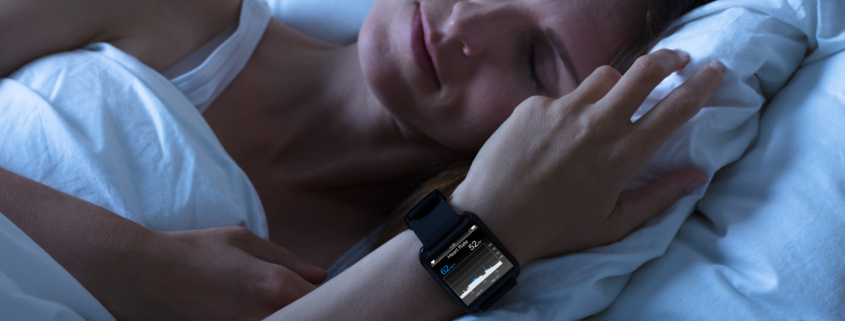Table of Contents
You might think you’re getting enough sleep—but what if your body disagrees? Waking up tired, struggling to focus, or feeling drained by midday could mean your sleep quality isn’t as good as you think. That’s why biohackers swear by sleep trackers. Here’s why they’re game-changers.
What Sleep Trackers Actually Measure
Most people assume sleep tracking is just about counting hours, but much more is happening beneath the surface. Sleep trackers provide insights into REM cycles, deep sleep, heart rate, breathing patterns, and stress levels.
Deep sleep is when muscles repair, hormones balance, and the brain detoxes. REM sleep, on the other hand, is critical for memory, learning, and mood regulation. If either is lacking, your body isn’t fully recovering, no matter how long you stay in bed.
A sleep tracker can pinpoint precisely where your sleep is going wrong. Too much time in light sleep? Restless wake-ups? High heart rate? Identifying these patterns is the first step to fixing them.
Why Biohackers Swear by Sleep Data

Biohackers are all about optimizing performance, and sleep is the foundation of everything. When sleep is dialed in, energy is higher, focus is sharper, and workouts are more effective.
One of the biggest benefits of sleep tracking is detecting lifestyle factors that sabotage rest. Is there too much caffeine? Are you eating too late? Are stress levels too high? Sleep data doesn’t lie. It shows what’s disrupting deep sleep so changes can be made.
Some biohackers even use sleep trackers to experiment with different routines—adjusting light exposure, bedtime, and supplements—to see what truly works. With data, better sleep becomes a science, not a guessing game.
How Sleep Tracking Can Improve Your Daily Energy
Many people think feeling tired is normal, but it’s often just a sign of poor sleep efficiency. Sleep tracking helps uncover hidden issues like poor recovery, nighttime wake-ups, and elevated heart rate.
By making minor adjustments—like getting more morning sunlight, changing nighttime routines, or improving sleep environment—energy levels often skyrocket. More deep sleep means better hormone balance, faster muscle recovery, and improved immune function. In short, better sleep = better everything.
Beyond just tracking, smart sleep devices offer actionable solutions. Features like smart alarms wake you during the lightest sleep phase, preventing grogginess, while HRV (heart rate variability) tracking helps fine-tune recovery habits.
The Surprising Link Between Sleep and Aging

Poor sleep doesn’t just make mornings miserable—it accelerates aging. When sleep quality drops, cortisol (the stress hormone) stays high, breaking down collagen and leading to wrinkles, fatigue, and dull skin.
Deep sleep is when the body repairs itself, producing growth hormones that keep skin firm, muscles strong, and metabolism steady. Without enough deep rest, the aging process speeds up, inside and out.
But sleep isn’t just about looking younger—it protects the brain from premature aging, too. During deep sleep, the brain clears out toxic waste through the glymphatic system, reducing the risk of neurodegenerative diseases like Alzheimer’s. Melatonin, the body’s natural sleep hormone, is a powerful antioxidant, protecting cells from oxidative stress.
Biohackers use sleep tracking and optimization strategies to ensure they get the kind of rest that slows aging at the cellular level—and so can you.
How Nicotine Plays a Surprising Role in Sleep Optimization
Most people don’t associate nicotine with sleep, but in controlled, clean forms, it can play a role in better focus and stress regulation.
Unlike smoking or vaping, which flood the body with high doses of nicotine and other chemicals, low-dose nicotine lozenges like those from Mick’s Naturals offer a cleaner way to support cognitive function without overstimulation.
When used earlier in the day, nicotine can help sharpen focus and balance stress levels, leading to more relaxed evenings and better sleep cycles. It’s another tool that biohackers strategically use to optimize mental performance while protecting sleep quality.
Choosing the Right Sleep Tracker

With so many options on the market, choosing the best sleep tracker depends on what data is most beneficial. Some of the most popular choices include:
- Wearable Trackers (Smartwatches, Rings) – Devices like the Oura Ring and WHOOP provide detailed sleep cycle tracking, heart rate variability, and recovery insights.
- Non-Wearable Trackers – Some sleep trackers, like under-mattress sensors, provide sleep data without needing to wear anything.
- Smartphone Apps – While less advanced, some apps analyze sleep patterns using motion and sound tracking.
For serious biohackers, a dedicated sleep-tracking device is the way to go. The more precise the data, the easier it is to optimize sleep and wake up feeling refreshed.
One Small Habit = Big Sleep Upgrades
Quality sleep goes a long way toward rejuvenating the body. A sleep tracker helps eliminate guesswork and gives real insights into what’s helping or hurting recovery. If waking up tired is the norm, tracking sleep might be the easiest way to fix it. The data doesn’t lie; once sleep improves, everything else follows.

Hi! I’m Dave, a longtime biohacker focused on natural ways to improve health and performance. My work revolves around analyzing the science behind cognitive enhancers, nutrition, and longevity strategies. I’m particularly interested in natural nicotine products and their effects on focus and energy. Everything I share is based on research and real-world application, ensuring practical, reliable insights. Please note, none of the information shared here is medical advice.




